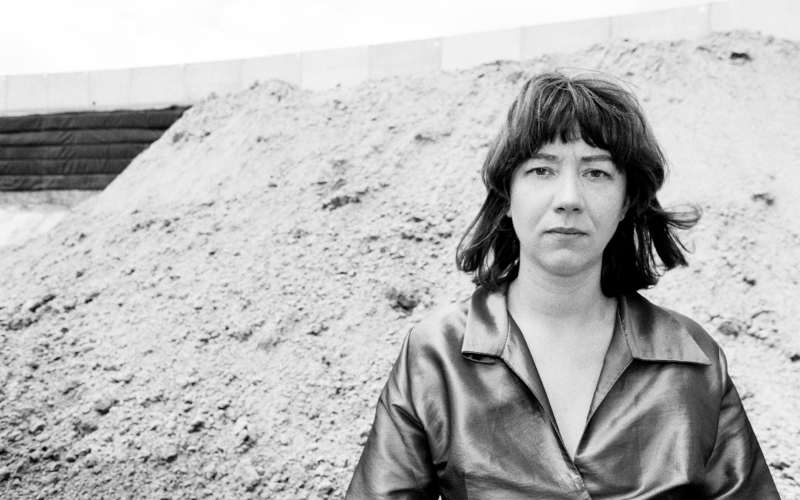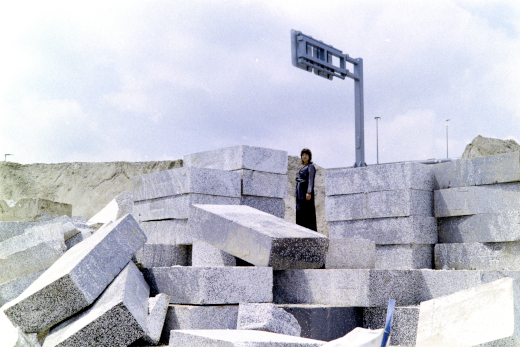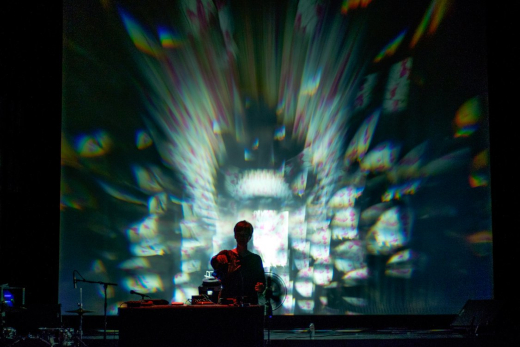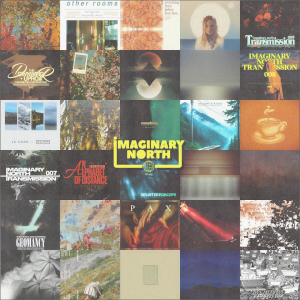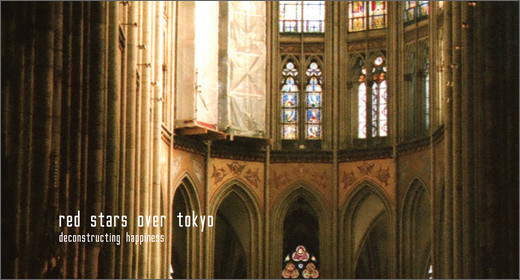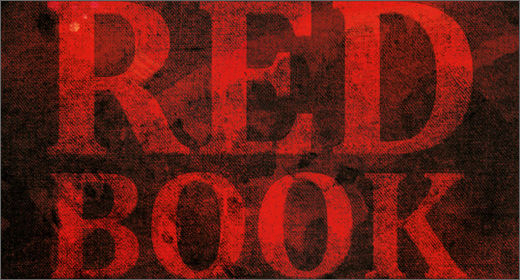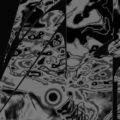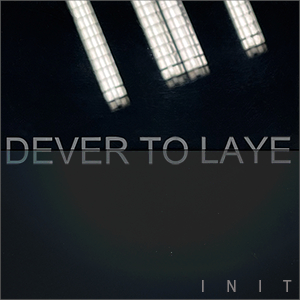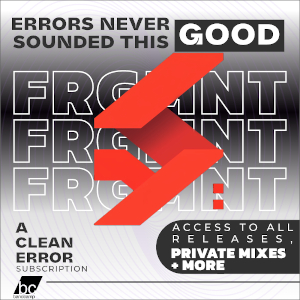On Bare Ground is a sculptural work blending its lo-fi with haunting melodies, field recordings, and ethereal soundscapes. Uncompromising in its approach, the album evokes the echoes of experimental music from a spectrum that ranges from dark bedroom pop to rhythmic noise, crafting a cloudy and dreamlike atmosphere.
A particular sensitivity to everyday sounds
The artistic alias of Dutch artist Marijn Verbiesen (aka Red Brut), who recently moved to Groningen and has been a vital force in Rotterdam’s art scene. Her work reveals a particular sensitivity to everyday sounds, the soundscapes of cassette music, musique concrète, and spontaneous sound collage, combining these elements into a unique and truly personal avant-garde expression.
Red Brut’s third album, On Bare Ground, is a sonic tapestry woven from the final threads of her Rotterdam existence. Entirely composed of soundscapes captured during her last two years in the city, the album evolves into a poignant farewell as its creation mirrors the passage of time, culminating in a profound departure from her life there.
On Bare Ground is a sculptural work blending its lo-fi with haunting melodies, field recordings, and ethereal soundscapes. Uncompromising in its approach, the album evokes the echoes of experimental music from a spectrum that ranges from dark bedroom pop to rhythmic noise, crafting a cloudy and dreamlike atmosphere. With meticulous attention, it unfolds as a strong hypnotic journey, where intricate sounds emerge from a hidden center, while, in a parallel narrative, they gradually expose On Bare Ground’s underlying deep melancholic core.
“I always considered my personal surroundings instruments or providers in sound.” ~Marijn Verbiesen
Igloo :: You recently moved from Rotterdam to Groningen, but do you remember why you initially wanted to live in Rotterdam?
Marijn Verbiesen :: It was around 2010 when I moved to Rotterdam. I moved there after finishing my studies. I was still living in Utrecht, traveling back and forth. Never understood the city that well, so I didn’t feel the urge to move there. But during my last internship, I met inspiring people who showed me the light. Back then, Rotterdam was still a very raw city; nobody wanted to live there, but it was a place of possibilities for people like us. In the art and music scene, there weren’t a lot of places to show your work; people started doing this themselves.
The Rotterdam ‘mouwen opstropen en gaan’ (roll up your sleeves and go) mentality if you will. With a lot of buildings being empty, it was quite easy to do so. Around that time, I also began organizing concerts with my former partner. Again, for the reason that artists (in the experimental scene) especially those who were just starting, didn’t have a place to go. We did this for years, also collaborating with others and even ran our own venue for a while. It’s when more people started setting up concerts since running the venue was quite a heavy burden, we decided to stop. But then corona happened and everything died down.
During this whole time, Rotterdam was rebranding and rebuilding, in the worst possible way. It got gentrified. Where Rotterdam was once a place of possibilities, the people who did meaningful things for the community were shooed away and the old buildings and houses were replaced by beige flats where nobody can afford to live in. I guess this happens in all big cities in the world, and many people have experienced this, so I’ll save you the rest of this rant.
And why did you decide to leave Rotterdam?
Marijn Verbiesen :: It didn’t feel like home anymore and I also was looking for a more sense of community. Cities like this don’t exist anymore in The Netherlands, so moving to a familiar city was the best next option. Groningen. I felt right at home. Because the city is small the scene is as well, but it’s a tightly knit one because of it. People feel responsible and put in the effort to keep things going. Be it as an organizer or as the audience.
You made a new album called On Bare Ground. You said you worked on this album for two years, but what does ‘working on an album for two years‘ mean?
Marijn Verbiesen :: It’s an ongoing process. I’m always listening to sounds, and recording them, wherever I am. Usually at home. In my new house, I put in a new wooden floor, it’s creaky like you wouldn’t believe it. It’s like the whole house is an instrument, only because of that. But I’ve always considered my personal surroundings instruments or providers in sound.
For this record, the process was a bit different. Without fully realizing it, I already recorded a lot of sounds, and I never got around to processing them. All the sounds were from my last period in Rotterdam. It was quite nostalgic listening back, as for me, this feels like listening to my diary. Putting it all together was like a final goodbye.
I always try to make a concept for a new album beforehand but fail to carry out the first idea and end up with a completely different thing. It’s probably because the main concept is my life and I don’t always get to choose how that goes. I do like this process, though, comes with a lot of mud crawling, as I call it lovingly, but don’t ask me about it while I’m in the middle of it.
“All the sounds were from my last period in Rotterdam. It was quite nostalgic listening back, as for me, this feels like listening to my diary. Putting it all together was like a final goodbye.” ~Marijn Verbiesen
If you put together an album, do you choose the best parts or the parts which fit together the best?
Marijn Verbiesen :: Both, but it’s not only about how the sounds ‘fit together’, it’s also about how the sounds influence each other. They can transform in meaning. For example, if you put a mechanical sound next to a sound that normally wouldn’t be heard in that context, you might not recognize the sounds anymore. It can become something new. That’s also why I don’t like to tell people where the sounds stem from because it’s up to the listener to make their own story out of it. And it’s always going to be a story because the sounds are very personal.
In one way, your music sounds free and playful, but on the other hand, it sounds very precise, very well structured.
Marijn Verbiesen :: Ha yes, in a way this describes me as a person as well. It’s me processing chaos.
There’s this line that says: “Tell me who your heroes are and I tell you who you are.” Who are your heroes, within music and outside of music?
Marijn Verbiesen :: The people around me who have always supported my music and given me a place in this small world. And not only for me but also for others so that we can continue doing this and expanding this family because that’s how it feels, every time I’m playing in a (new) place I get to meet new inspiring, like-minded people or weirdos as I like to call us. We definitely need more weirdos on this planet.
What attracts you in this kind of tape-based sound art collage you make?
Marijn Verbiesen :: With my first band Sweat Tongue, we recorded our rehearsals straight onto tape and released that as an album. It felt quite liberating to work like that. It felt liberating to start playing and instantly make an album out of it. No hassle around it, that’s it.
I like the sound of the tape itself and that you can work with the sounds in a physical way. Like with Red Brut, I splice the tapes in the length of the sounds. So I’m recording them, removing the leftover tape, and taping it back together. It’s quite a lot of work, but the manual labor of it all is a meditative act for me. It’s part of the ritual.
In another sense, with tapes, I can see the sounds before me as I lay them out on the table. Live, I always try to improvise and create new combinations and patterns.
In an text written by Niels Latomme about your album, Niels says you ‘stripped down‘ on this album, leaving a ballast behind.
Marijn Verbiesen :: I wouldn’t call it a ballast, but I definitely left something behind, haha. I lived there for more than a decade and it’s the place where I had many firsts. I started making music and setting up concerts, amongst others, it changed my view on things completely. But sometimes when you spend too much time in the same surroundings, you can get closed off from seeing new things or getting inspiration, connections and people. It can get rather lonely. Moving to a new place opened me back up to those things. Reflecting on my music.
On Bare Ground is available November 22, 2024 on Coherent States, Dead Mind, and Econore. [Bandcamp]






